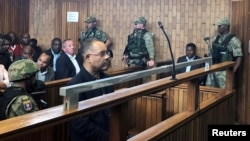Manuel Chang spent less than an hour in a Johannesburg courtroom on Tuesday, appearing confident and relaxed in jeans and a blue blazer as South African lawyers discussed the fate of Mozambique's former finance minister. Chang was arrested last month in a U.S. investigation into Mozambique's massive debt scandal.
But no one thinks this trial, which spans four continents — Africa, North America, Europe and Asia — and encompasses a growing list of suspected accomplices, will be quick or easy.
Chang is one of several dozen people now implicated on both sides of the Atlantic in the case that led the coastal nation to suffer a debt crisis so severe it has deprived citizens of essential services like road and hospital maintenance.
Elpideo Mutemba was one of several Mozambican activists who came to watch Chang's court appearance Tuesday.
Mutemba told VOA he was glad Chang was arrested in South Africa and will, if the extradition order is heeded, be tried in the U.S., even if it slows down the process.
But he shrugged at the news that Mozambican officials had, just a day earlier, indicted 18 people in connection to the case. Mozambique, he argued, has known about this scandal since 2016, when $2 billion in secret loans were discovered, and these are the very first signs of movement from Mozambican authorities.
"We don't trust our justice system, as we have many pending cases where .... they didn't come up with any solution, justice was never done," he said. "So, we do believe in maybe outside [intervention], and not only because it will be outside, but those who are really still implicated in the matter, they can fall with him."
US indictment
A U.S. grand jury indictment issued last week accuses seven people, including Chang, of creating fake maritime projects "as fronts to raise money to enrich themselves and intentionally divert portions of the loan proceeds to pay at least $200 million in bribes and kickbacks to themselves, Mozambican government officials and others."
In court on Tuesday, the prosecutors said they suspected Chang himself netted some $12 million dollars in bribes.
The case, like many financial crimes cases, is rife with details and technicalities. One such technicality is the basis the grand jury used in its indictment: that one of the financial institutions allegedly involved was required to report its doings to U.S. authorities.
Chang was arrested last month in South Africa on what officials said was a U.S. extradition warrant, although his lawyers argued Tuesday that proper procedures were not followed.
Chang's lawyer, Willie Vermeulen, argued that based on a technicality, his client should be released on bail.
"The only basis for a provisional arrest is Article 13 of the treaty," he argued. "That is all, thank you, I ask you accordingly to release Mr. Chang."
Mutemba, the activist, said he is happy to follow this complicated tale to the end, wherever that leads. He suspects many more names will come out in the course of the investigation, including Mozambique's former president, Armando Guebuza and the current president, Filipe Nyusi, who was defense minister at the time of the loans, taken between 2013 and 2014.
"You can't tell me that he didn't know that there was an agreement, a loan, of a huge amount of that nature, all of them," he said.
When asked to clarify which president — the former or the current — he meant, he clarified.
"I'm saying about President Guebuza, even though Nyusi was there in that regime, and even now, Nyusi's there, but he never said anything," he said. "We want to hear from him as a president."





